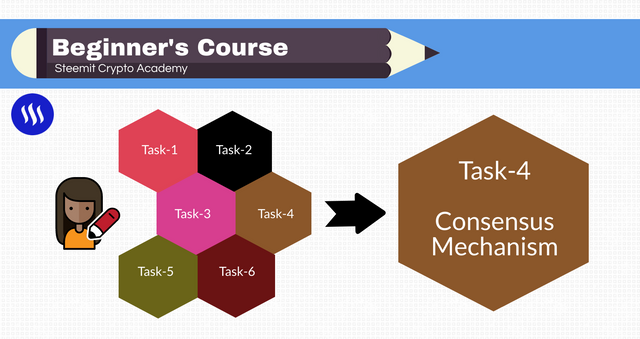Crypto Academy Season 3 Beginners' course - Task 4: Different types of Consensus Mechanisms
In this post, I try to finish Crypto Academy Season 3 Beginners' course task 4 homework, given by professor @sapwood.
(1) What is the difference between PoW & PoS? Advantages & Disadvantages? Which one is better in scaling Capacity? Examples?
As we all know that there are several types of consensus algorithms used by several crypto coins in this world, for example bitcoin which uses the Proof-of-Work (PoW) algorithm, and Peercoin which uses the Proof-of-Stake (PoS) algorithm and also Ethereum is hard-fork moving to PoS algorithm. So what is the difference between PoW and PoS algorithm, let's discuss the difference between the two.

Proof of Work requires us to do mining by solving complex mathematical problems so that we are entitled to be able to produce blocks. Whereas Proof of Stake is non-mathematical, so we don't need to solve complex math to generate blocks but simply have our coins and stake our coins. By staking coins, we have the right to produce blocks without having to solve math like in the PoW consensus algorithm.
The difference between the two is as follows:
The PoW consensus algorithm requires miners to verify transactions, while the PoS algorithm does not, the Validator is given the right to do so. Furthermore, PoW requires us to solve very complex math in order to produce blocks, whereas PoS only needs to stake coins to be able to produce blocks and become validators.
Another difference, in PoW the first person who is able to solve this complex math problem will be rewarded, and the right to produce the next block. This is not the case in the PoS consensus algorithm, because validators can increase their ranking without having to upgrade their computer system, simply by risking more coins for a long time.
Proof of Work has a decentralized mechanism that is at the heart of the blockchain that most people want, whereas PoS mechanism is more Centralized, and this is another difference between PoW and PoS.
The mining process requires a lot of resources and energy to produce blocks, while the validation system is energy efficient. This is the basic difference between the two, if we want to discuss further about the differences between the two, there will be no end.

| ADVANTAGES PoW | DISADVANTAGES PoW |
|---|---|
| Anyone can be a miner | Requires expensive equipment to become a miner |
| Transactions are more accurate | Requires a lot of energy to mine |
| The PoW algorithm is more difficult to attack because it costs a lot of money | Even though it's hard there's a possibility of being attacked if 51% of the mining mechanism is taken over |
| It's fairer because the first miner to solve the problem is given a reward and the right to produce the next block | Transactions take too long |
| ADVANTAGES PoS | DISADVANTAGES PoS |
|---|---|
| Save energy because there is no need to solve complicated math | Centralized network |
| Cheaper for validators | Validators can increase their own ranking by risking more coins |
| Excellent scalability | Betting coins is more profitable than releasing them so that the coin owner has no incentive to release coins to other parties. |

In this case, I think PoS consensus algorithm has better scaling capacity than PoW. Since PoS is basically created to scale better than PoW, using a lot of energy will have a negative impact on the environment in the long run, this does not apply to the PoS consensus algorithm because it is very energy efficient.
For example, bitcoin which has an initial block size of 1 Mb, 1Mb size is very small to support and sustain thousands of transactions. That's why transactions in bitcoin take such a slow time, this is also the case with Ethereum coins. In fact, it takes almost 5 minutes to make bitcoin and Ethereum transactions, compared to coins that use the PoS consensus algorithm which only takes less than a minute.
If what I talked about above is still in doubt for you, please try to transfer BTC and ETH coins and see how many minutes it will take to arrive at the address we sent. Now try to transfer coins using the PoS consensus algorithm, and calculate how many seconds/minutes it will take to get to the destination address.
Coins that adopt the PoS consensus algorithm:
- Peercoins
- NXT
- Blackcoins
Coins that adopt the PoS consensus algorithm:
- Bitcoins
- Ethereum (currently updating to PoS algorithm)

You've got a free upvote from witness fuli.
Peace & Love!
Hi @reza-khem, Thank you for taking interest in the 4th Task of the Beginners Fixed Class. Your grades are as follows:
My Review and Suggestions:
You have completed the task.
There are some discussions that are still shallow.
Vary headers and sub-headers to make them look more attractive.
There are some grammatical errors, please pay attention to grammar before posting.
Thank you!